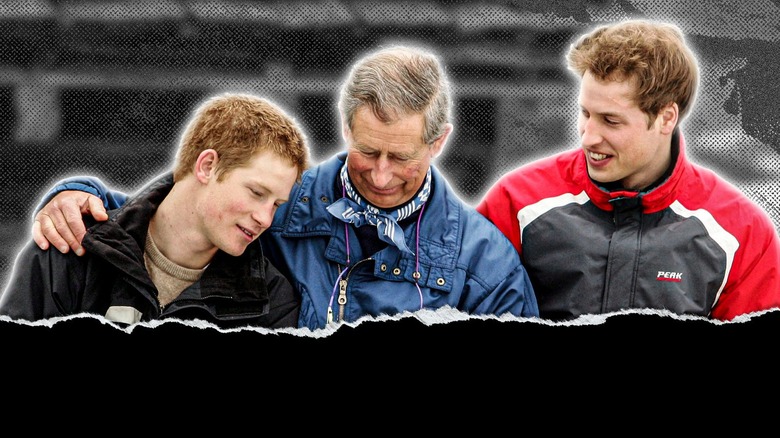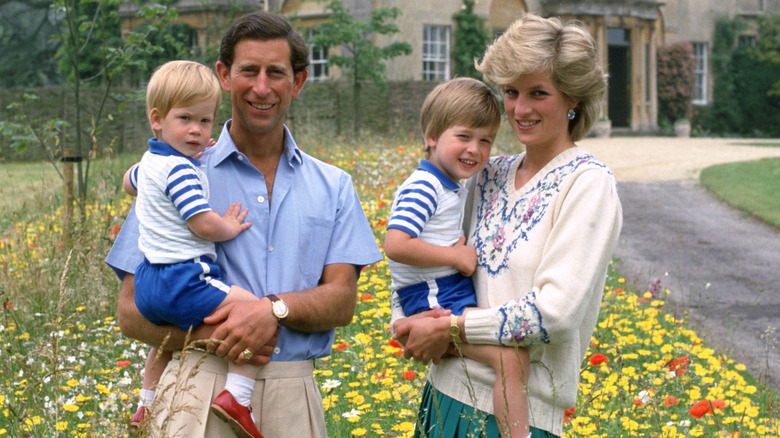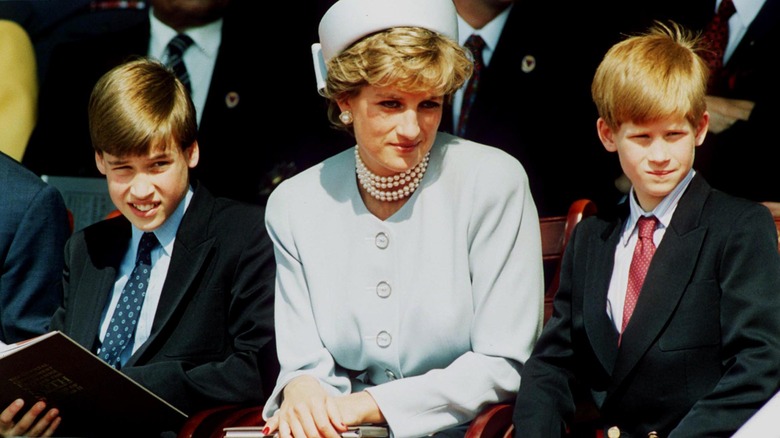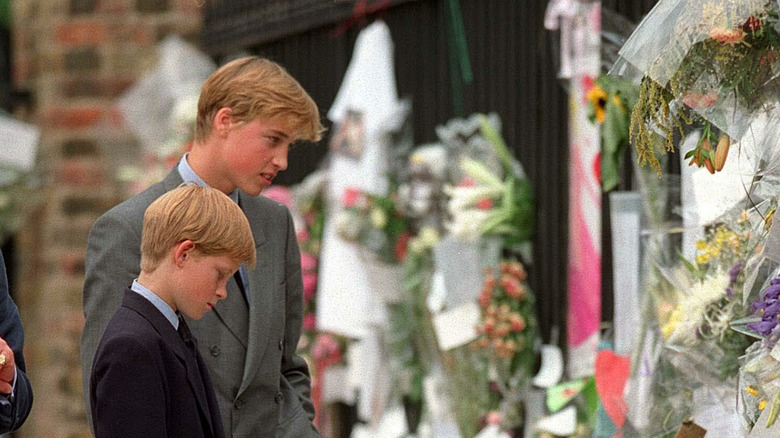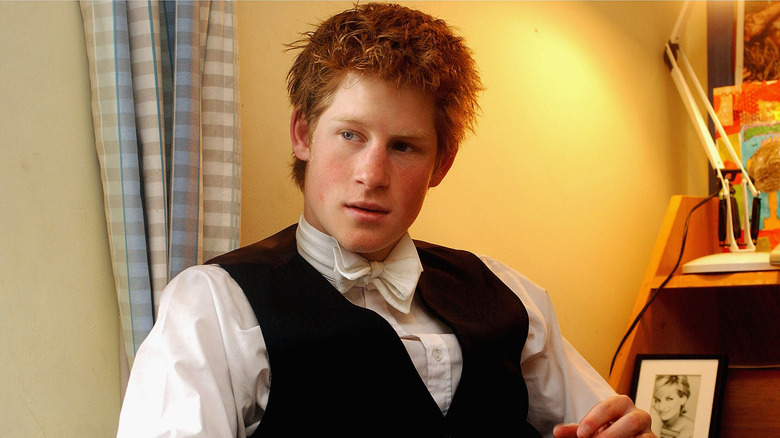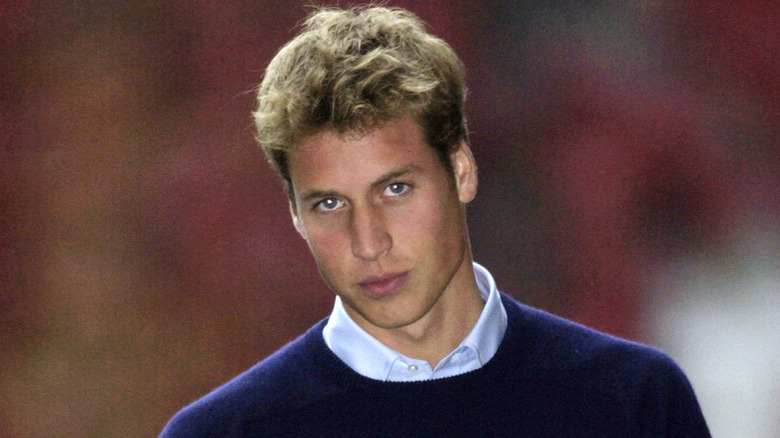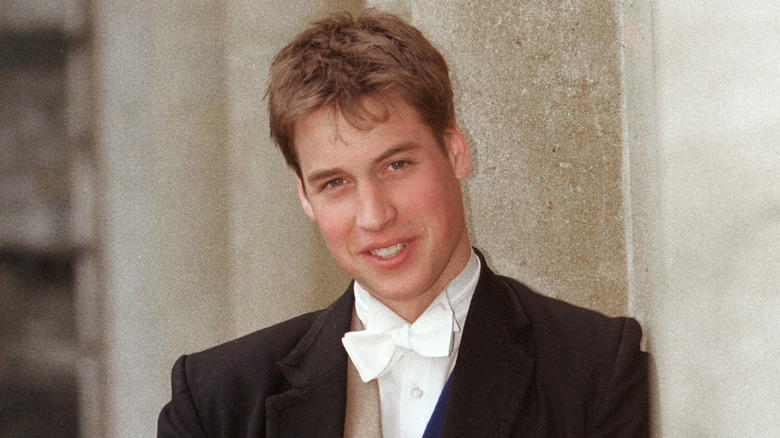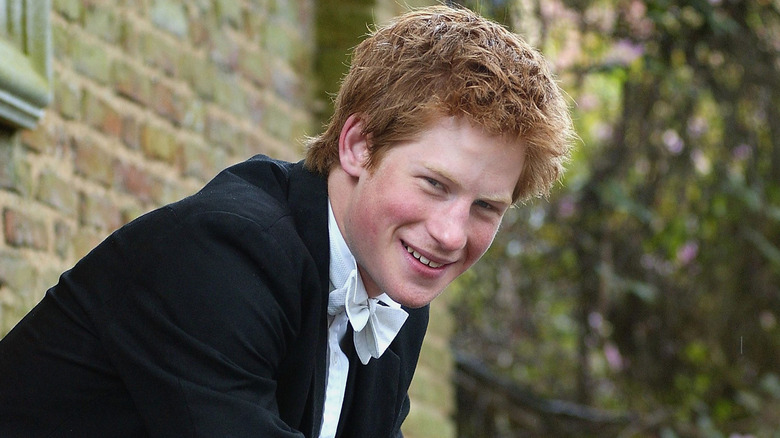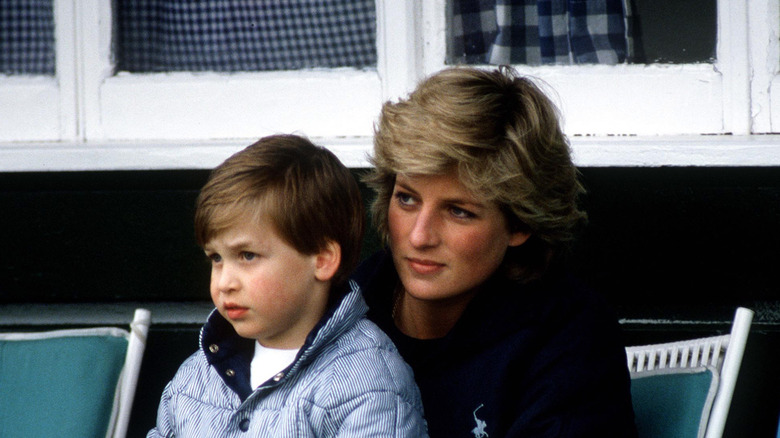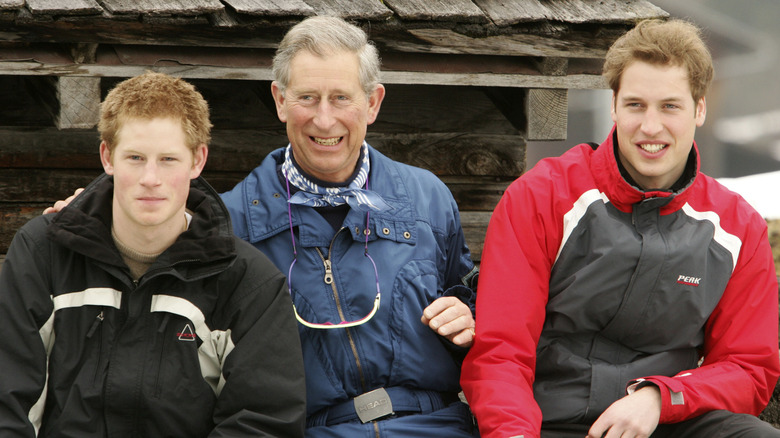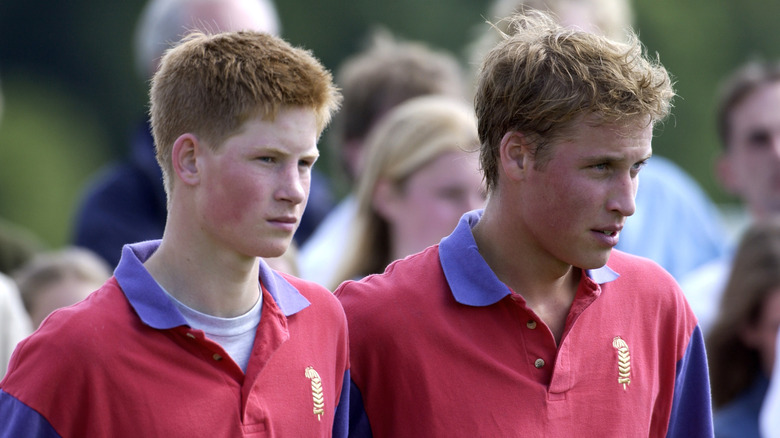Tragic Details About Prince William And Prince Harry's Childhood
William, Prince of Wales, and Prince Harry have two of the most famous faces in the world. Both are known for their royal British position and are equally as marked by the tragedy they faced in their childhoods. But it wasn't just the untimely passing of their mother, Princess Diana, that has impacted them from boyhood into adulthood. They faced surmounting pressures from family, the public, and from themselves as they navigated their grief throughout the years.
The brothers' bond also suffered as a result of the trials and tribulations that befell them. "Emotionally, they are very unalike," a royal insider shared with Newsweek. "They are bonded together by the unique position they are in and the experience of losing their mother very young. But they don't live in each other's pockets." From a young age, the young princes have dealt with the bright ups and dark downs of their childhoods both in private and in the public eye.
Prince William and Prince Harry dealt with their parents' rocky relationship firsthand
Growing up, both Prince William and the younger Prince Harry experienced the turmoil of their royal parents' rocky relationship. Despite Princess Diana nearly calling off their wedding, the then Prince Charles and Princess Diana got married in a lavish affair in 1981. Prince William was born the year after, and Prince Harry followed in 1984. For a decade, both boys were exposed to the toxic nature of their parents' crumbling marriage. "Both boys lived through what was going on on a daily basis," biographer Andrew Morton said on "Loose Women" (via Daily Mail).
Between Princess Diana's refusal to follow royal protocol and then Prince Charles' shady affair with his then lover Camilla Parker Bowles, the royal princes were surrounded by scandal. To make matters worse, the prince and princess clashed over how they wanted to raise their children in the spotlight. Royal experts have even claimed that it wasn't just the pair's emotional health that was impacted by their parents' failed marriage, but also the legacy of their overall royal lineage.
Charles and Diana's tumultuous relationship came to an end when they infamously split in 1992 and finally divorced in 1996, but the princes still faced difficulties following their parents' separation. Thankfully, their school at the time made a point of shielding the young men from the tabloid craze that followed. "It took them out of troubled waters," royal expert Dickie Arbiter told Express.
They were viewed differently after their mother pushed for them to have normal lives
Princess Diana wasn't the typical royal when it came to her sons, and she was adamant that they live as normal of lives as they could. Both Prince William and Prince Harry were exposed to everyday happenings like riding trains in the London Tube, waiting in line for rides at amusement parks, and even dining at McDonald's alongside their mother. The pair were also enrolled in public school and broke major royal protocol by exchanging warm embraces and kisses with their mother in public. "She was very demonstrative toward them," royal commentator Penny Junor noted in the CNN docuseries, "Diana."
These seemingly "normal" circumstances endeared the two princes and their matriarch to the public, but it also caused tensions within the royal family. Protocol called for a more restrained and orchestrated childhood for the young princes, and the then Prince Charles was not one to deviate much from tradition. To make matters worse, sometimes the brothers would even receive special treatment over the other from royal family members, like Queen Elizabeth II, which was something that angered Diana.
But despite the tension, the children experienced untarnished affection when it came to their mother. "She never once allowed her unfaltering love for us to go unspoken or undemonstrated," Prince Harry said in a memorial speech on the 10th anniversary of Diana's death.
Their mother died tragically and infamously
When Prince William was 15 and Prince Harry was 12, their mother, Princess Diana, was tragically killed in a car accident in Paris in 1997. The event shook the world to its core, and for her two sons, it impacted them deeply.
The brothers spent years not only seeing millions of tributes to their mother, but also dealing with their own emotions over her passing. "It's like an earthquake has just run through the house and through your life and everything," Prince William once said of his grief in the documentary "Diana, Our Mother: Her Life and Legacy" (via Town and Country). "Your mind is completely split. And it took me a while for it to actually sink in."
At her funeral, one of the most viewed live events in history, the boys experienced massive pressure front and center as they buried their mother in front of the world. "I don't think any child should be asked to do that, under any circumstances," Prince Harry later reflected in an interview with Newsweek. "I don't think it would happen today." But the memory of their mother lives on through them. The princes have spent the years since her passing maintaining her legacy by supporting global humanitarian efforts in her name.
Prince Harry fought off counseling for decades
As he wrestled with grief following the death of his mother, Prince Harry spent years avoiding healthy coping mechanisms with which to process. In his teenage years, he was viewed by the public as the wild royal, as he indulged in partying, driving fast cars, and generally acting out. "I suppressed it like most youngsters would have done," he shared in his "Heart of Invictus" Netflix documentary in 2023 (via Town and Country). "But when it all came fizzing out, I was bouncing off the walls."
It wasn't until years later, without the lens of adolescence, that he could properly reflect on the trauma that he experienced. He detailed the lack of support he felt from both the family around him and the world at large, particularly when it came to handling such large emotions. Plus, he was internally trying to prevent himself from losing the memories of his mother that he held dear.
"I thought that if I went to therapy it would kill me and that I would lose whatever I had left, whatever I managed to hold onto of my mother and it turns out that wasn't the case. I didn't lose that — it was the opposite," he shared with Dr. Gabor Mate in a livestreamed conversation (via Sky News).
Prince William dealt with his own mental health issues
Similarly to his younger brother, Prince William spent years hiding truths untold regarding his grief over his mother. Being the older brother and first in line to receive kingship, he had more responsibilities on his shoulders that he spent years prioritizing. He also carried these feelings with him throughout his life, whether during royal duties or during his own private time. "I think when you are bereaved at a very young age, any time really, but particularly at a young age ... you feel pain like no other pain," he shared with the BBC.
But as he grew older and started a family of his own, he learned ways to cope with his grief while also sharing the memory of his mother with his three children. "It's important that they knew who she was and that she existed," he said in the HBO documentary "Diana, Our Mother: Her Life and Legacy" (via Town and Country).
Prince William was burdened by his position from a young age
Being the oldest son, and therefore the heir closest to the throne of England, Prince William holds more weight in his royal position than his younger brother. Princess Diana recognized this and mourned for the life that her son would never lead. "She ... told me that William felt the burden of his destiny," former BBC royal correspondent Jennie Bond told OK!. "Unlike other young boys, he would never have freedom of choice over the job he would do or the direction of his life." But Bond also revealed that Diana thought that her oldest child would make a great king one day, despite the enormous pressure that comes with it.
It wasn't just William that she saw as a great potential ruler. Diana also gave her younger son, Harry, a special nickname based on the quality of character she saw in him at that age –- even though it showed one son more favorably considered for ruling than another. "Diana dubbed Harry GKH (Good King Harry) because she thought he would have been better equipped for the role as a future king," royal commentator Charles Rae claimed to Marie Claire. "It was also used to make Harry feel that extra special."
Prince Harry used his wild teenage years to mask his sorrow
Prince Harry was a notorious "bad boy" during his teenage years. The depths of his debauchery, from repeated drug use to raucous partying, added to the weight of the woe that allegedly pushed him in that rebellious direction in the first place. He even reportedly entered a rehabilitation clinic at just 17-years-old. In the press, he was described as detached and sometimes volatile. "His attention span is limited and he is inclined to disappear when he gets bored," one reporter once told The Guardian.
Prince Harry has since reflected on his troubled youth in his autobiography "Spare." He also shared that it took him until his 20s realize that there were better uses of his energy to help expel his grief, including by giving back. "I needed to fix the mistakes I was making," he shared with Newsweek. "I didn't want to be in the position I was in, but I eventually pulled my head out of the sand, started listening to people and decided to use my role for good."
A young Prince William was his mother's closest confidante
As a boy, the elder prince was reportedly one of his mother's trusted advisors, even at a very young age. Sources have speculated that as her marriage to Prince Charles fell apart, and she spent more of her time in "isolation" within her public position, she relied further on her sons in different ways. "Diana used her elder son as both a stand-in and a buffer," author Tina Brown wrote in "The Palace Papers" (via Vanity Fair). "By his early teens, he was his mother's most trusted confidant. She used to describe him as 'my little wise old man.'"
Diana allegedly asked her older son questions about life and how she should live it despite her role as princess. He attended events with her and, as then Daily Mirror editor Piers Morgan claimed, was even up-to-date on the tabloid rumors about his mother and her alleged lovers. These actions placed even more pressure on the teenage heir, putting him in a different position than his brother and even his closest family members by the time of her passing. "By confiding in William as much as she did, Diana was placing a significant emotional burden on an adolescent boy," biographer Sally Bedell Smith wrote in "Diana: In Search of Herself" (via Vanity Fair).
Prince Harry always felt different from his family
While his older brother became his mother's confidante, Prince Harry spent much of his childhood feeling separate from his family in a multitude of ways. As the younger son, his royal burden was further removed from the crown, and by proxy, his family. "It didn't make sense at the time," the royal recalled to Dr. Gabor Mate in a livestreamed conversation (via Sky News). "I felt as though my body was in there, but my head was out and sometimes it was vice versa."
Between feeling "different" from his family, to the persistent media who hounded his every move, Harry felt pressure on multiple levels. "I have probably been very close to a complete breakdown on numerous occasions, when all sorts of grief and sort of lies and misconceptions and everything are coming at you from every angle," he told The Telegraph in 2017. But this feeling was also something that he shared with his mother, who felt equally alienated by both the royal family and the paparazzi. Sharing this, even without her present, made Prince Harry feel more connected to her.
The brothers have maintained a longstanding rivalry since childhood
Despite all of the public scrutiny and inescapable royal protocol that they endured as a duo, both Prince William and Prince Harry maintained a brotherly rivalry with each other even from a young age. Even the standard childhood brawls would sometimes veer into real violence, where the boys would exchange punches that felt personal. "When they hit each other, they meant it," Ken Wharfe, the former protection officer to the childhood princes, claimed to The Royal Observer.
The clash grew stronger until Prince Harry's very public exit from royal duties following his marriage to Meghan Markle. He even detailed in his autobiography, "Spare," an instance where their childhood playfighting turned into an adulthood brawl, where William instigated and assaulted his younger brother. "Part of this role, part of this job, this family, being under the pressure which it's under, inevitably stuff happens," Harry once told ITV in 2019 (via CNN).

